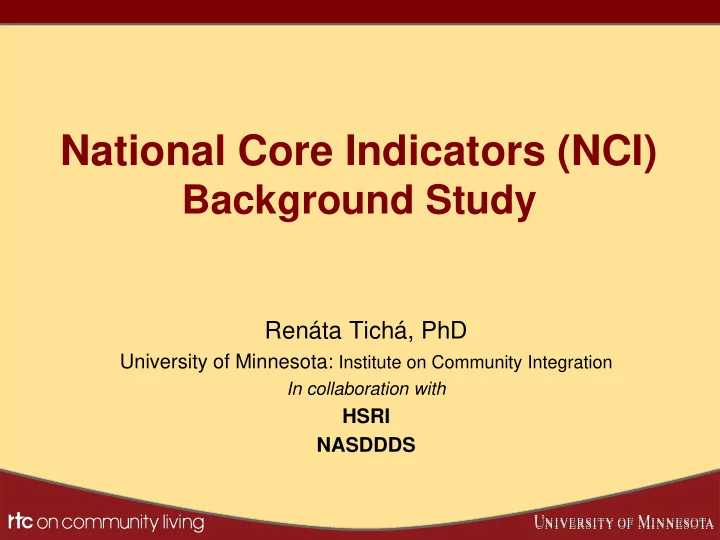

National Core Indicators (NCI) Background Study Renáta Tichá, PhD University of Minnesota: Institute on Community Integration In collaboration with HSRI NASDDDS
Introduction The study purpose is to: Establish the reliability and validity of 31 background questions (and related sub-questions) from the NCI Adult Consumer Survey (ACS) Working with three participating states: Oklahoma , Georgia and Washington (in that order) Evaluate the different approaches and rigor to background data collection across states
UMN’s Task To establish the consistency (reliability) and accuracy (… validity) of the background data by: Conducting interviews with guardians (or staff members) and people with disabilities (approximately 12 participants per state) Comparing data collected from multiple sources by contractors for data collection in each state and UMN
Focus: Oklahoma Data collection is headed by Oklahoma State University (OSU) Well designed data collection protocol with reliability checks built in Background section sources of data: State’s Client Contact Manager (CCM) online database - state Individualized plan - OSU Proxy (family member/guardian, direct care staff or both) – OSU, UMN Individual with a disability - UMN
Logistical and Methodological Insights Institutional Review Board (IRB) process can be lengthy Some individuals with IDD do not understand some or all of the background questions (validity) Some guardians and staff members do not know the information to some of the background questions Some IPs do not contain the most current or accurate information
Preliminary Result Highlights Questions that tended to be less reliable: BI-7: Does this person have a legal/court-appointed guardian? BI-11: Is this person diagnosed with an intellectual disability (ID)? If yes, what level of ID? BI-12: What other conditions are noted in this person’s record? BI-19: When was the last time this person had an eye examination/vision screening? BI-20: When was the last time this person had a hearing test? BI-25: If female, when was her last Pap test screening? BI-29: Does this person currently take medications to treat mood disorders, anxiety, and/or psychotic disorders? BI-29a: Does this person currently take medications for behavioral challenges? BI-31: Does this person have a behavior plan?
Preliminary Result Highlights cont. BI-38: What amount of paid support does this person receive at home? BI-39-43: Employment/other daily activities Type of activity, number of hours, wages BI-55-57: Does person need support to manage: self-injurious, disruptive behavior or behavior that is destructive/ harmful to others? Questions that tended to be reliable: All others
Summary Preliminary results indicate that of the 31 background questions examined, 17 questions tended to produce less reliable data, while 14 questions tended to be reliable (more concrete reliability estimates will be produced with additional data collected) As can be seen from the list, some of the discrepancies in answers may matter more than others Discrepancies are for various reasons: unclear wording of the question inconsistent administration of the question lack of knowledge of the individual individual’s lack of ability to understand questions IPs that have not been updated These are only preliminary results that will be refined based on additional data!
Implication and Next Steps Determine how each state/ contractor gathers data – what sources are used and how is consensus reached to establish validity for reporting? Determine what source(s) of information is most reliable for each question What are the factors that lead to unreliable data? Are there questions that we cannot or do not need to ask in the background section? If we cannot get reliable answers, we cannot have a valid data. Data from GA and WA needs to be added to the results
Recommend
More recommend